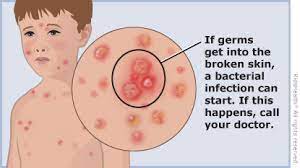- Get link
- X
- Other Apps
- Get link
- X
- Other Apps
The varicella-zoster virus is responsible for the highly contagious viral infection known as chickenpox. It is a common illness that affects children and typically results in a blister-like rash on the skin. In most cases, it is a mild illness, but in some groups, like infants, pregnant women, and people with weak immune systems, it can be more serious.
The varicella-zoster infection can be spread through the air or through contact with the liquid from a contaminated individual's rankles when they hack or wheeze. Toys and door handles that have been sullied can likewise spread the infection. Before the rash shows up and until each of the rankles have crusted over, individuals who have chickenpox are infectious. For chickenpox, the hatching time frame ordinarily goes from 14 to 16 days.
Symptoms of chickenpox usually begin with a fever, headache, and a feeling of general malaise. This is followed by the appearance of the classic rash, which starts as small, red bumps that quickly become fluid-filled blisters. The rash usually begins on the face, chest, and back, and then spreads to other parts of the body. The blisters can be extremely itchy, and scratching them can lead to scarring or infection.
Chickenpox has no known cure, but treatment focuses on alleviating symptoms and avoiding complications. Acetaminophen and ibuprofen, two common over-the-counter medications, can be used to ease pain and reduce fever. Itching can be alleviated with calamine lotion. Antiviral medication may be prescribed in severe cases.
Vaccination is the best strategy for thwarting chickenpox. All children between the ages of 12 and 15 months should get the safeguarded and practical chickenpox vaccination, with an ally segment directed between the ages of 4 and 6 years. Adults who have neither had chickenpox nor been inoculated are moreover encouraged to get the vaccination.
In conclusion, chickenpox is a common illness that affects children. It can be highly contagious and cause pain for the person who gets it. Preventing the virus's spread and seeking medical attention when symptoms become severe are essential. The best way to avoid chickenpox and its complications is to get vaccinated.
- Get link
- X
- Other Apps


Comments
Post a Comment
If you have any doubts, Please let me know.